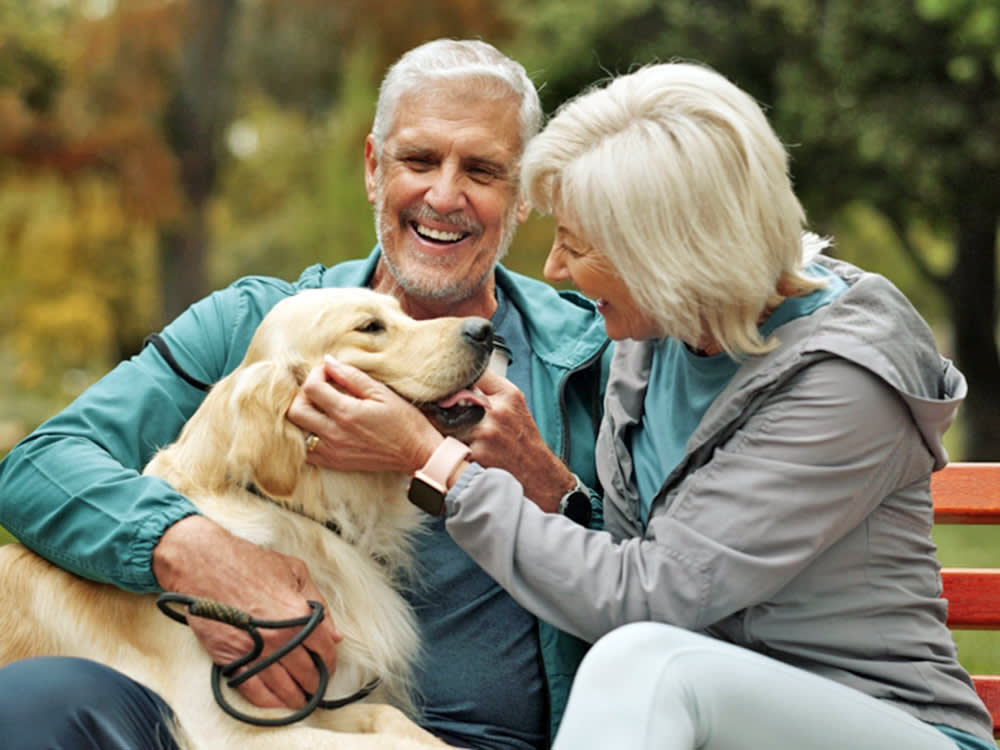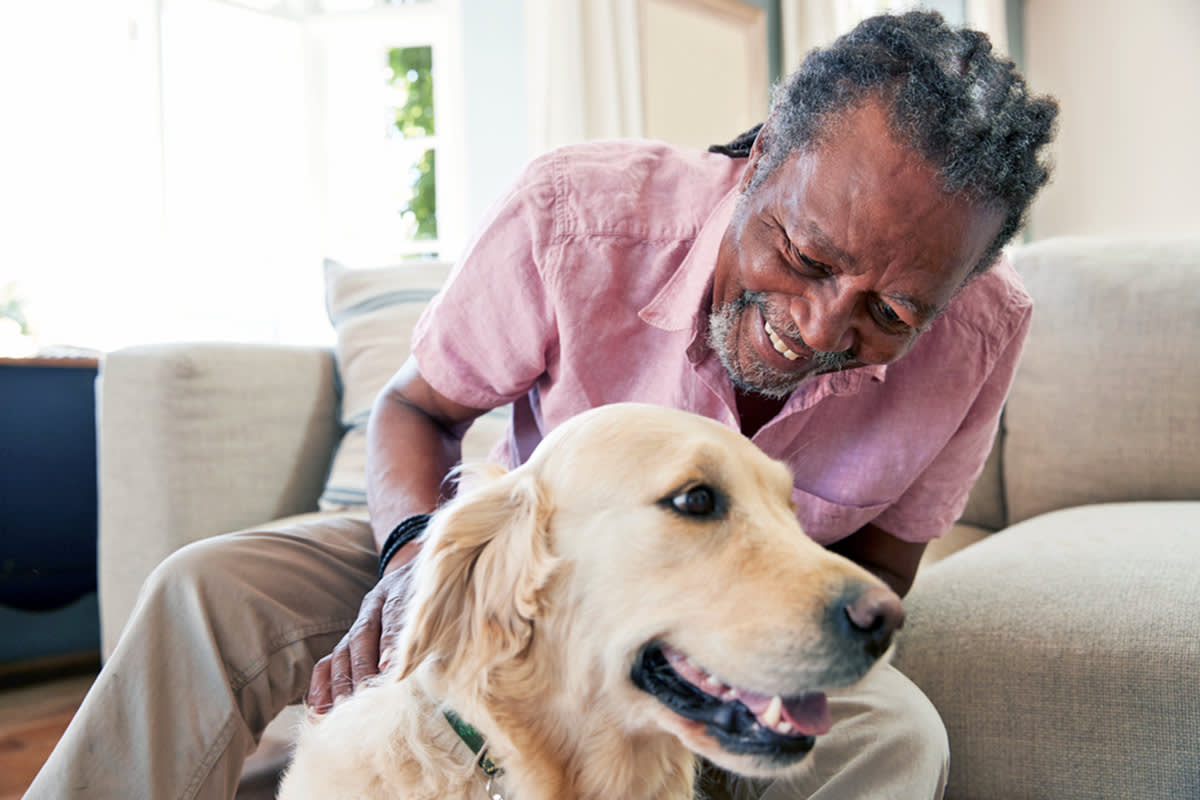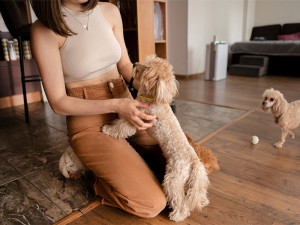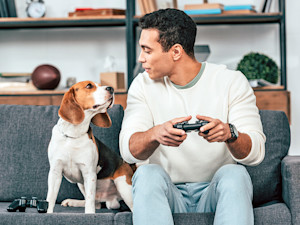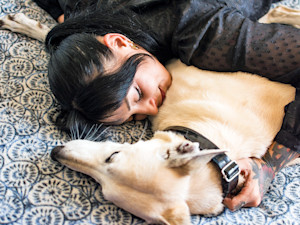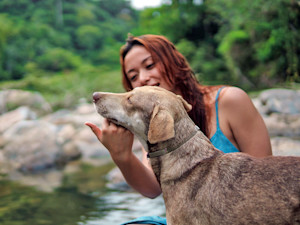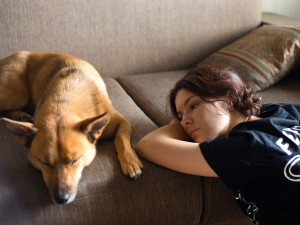Why Are Dogs So Obsessed With Their Human Grandparents?
For one, they definitely don’t mind getting spoiled.
There’s nothing quite like grandma’s house. The cozy decor, the nostalgia-inducing smells, the little treats…
For humans, at least, our grandparents’ house can be a home away from home. And if TikTokopens in new tab and YouTubeopens in new tab are any indicationopens in new tab, some dogs get just as excited for a day of fun, games, and pampering. But how, exactly, do our pups think of these relationships — and is there a chance that getting spoiled at grandma’s house could undermine their relationships with us?
Sadly, scientists haven’t spent a ton of time trying to decode the relationships that form between dogs and their human “grandparents.” But we do know that dogs can form deep relationships with new people quickly — especially if they see them with fair regularity.
“Just like people have particular friendships, so, too, do our dogs form particular relationships that are meaningful for them,” says behavioral scientist Clive Wynne, Ph.D. — founding director of the Canine Science Collaboratoryopens in new tab at Arizona State University and author of Dog Is Love: Why and How Your Dog Loves Youopens in new tab.
How much do you spend on your pet per year?
“The difference is that, whereas you can ask somebody ‘Why is Jimmy your best friend?’ … we cannot ask our dogs.”
First of all, do dogs even understand the concept of grandparents?
Chances are, your dog has no idea that you and your parents are related — so whatever bond they’ve formed with their “grandparents,” it’s based on affection for them as individuals.
“Dogs don’t even recognize their own families,” Wynne says. “If they’re not living together [and] they’re reintroduced to a brother or sister, they may not recognize them.”
If our dogs can’t sniff out their own families, chances are good they can’t tell who our relatives are, either. “There’s a slight possibility that maybe by body odor or something, [dogs] do detect human family relationships,” Wynne says, “but I doubt it. I really think it’s just the person.”
Can dogs form family-like bonds with their “grandparents”?
It sure does look that way, doesn’t it?
In videos on social media, we see just how excited dogs can get about seeing their grandparents. Sometimes, they perk up at the mention of “grandma’s house.” On other occasions, they bolt out of the car, across the front lawn, and up to their grandparents’ front door. And once in a while, we see very cute (almost certainly staged) shots of the fun activities they do while their parents are away — like reading stories and eating doggie biscuits.
Just like anyone else your dog spends time with, there’s a good chance they’ll take a liking to their grandparents. Often, Wynne says, it’s hard to know why dogs bond with certain people. For example, he says, his own adopted Greyhound is absolutely crazy about one of his house cleaners — a husband-and-wife couple who stop by once per week.
“She just sees him once a week for about two ho
urs, during which time he's primarily busy doing things that are not, in themselves, attractive to a dog,” Wynne marvels. After all, “He’s not a butcher who comes to chop up some meat or something.”
And yes, before you ask, your dog’s grandparents can absolutely buy their love with treats. “Every criminal knows that a guard dog can be outwitted [with] some steak,” Wynne says. Plus, chances are, if your parents think of your dog as their grandchild, they are likely going to bust out the good treats; how could a pup not got excited for that?
Is it good for dogs to bond with their grandparents?
It never hurts to give your dog more stable, rewarding relationships — assuming they’re game to make new friends. Dogs who have a few trusted humans in their lives might adapt better if their primary caretaker or owner has an emergency, says Niamh Coleman, owner of Canine Connection COopens in new tab. And even under normal circumstances, it’s always good to have a few additional caretakers who can fill in for you if you go out of town.
“If you have the option of giving your dog a larger human community of people that they know and trust and like, that can be a pretty good thing,” Wynne says, adding that familiar dog sitters provide “a sense of stability in an otherwise disruptive time.”
And don’t worry: No matter how much your parents might overindulge and coddle your pup, it won’t undermine your relationship with you or make them love home any less. For that to happen, Wynne says, “It would have to be, like, sawdust for dinner at one place and steak in the other.“
Can a trip to grandma’s place throw off my dog’s routine?
Some of us keep our dogs on a more regimented schedule than others. But even if your dog is set in their ways, rest assured, it’s still often possible to learn a new routine.
Having worked in veterinary hospitals, animal shelters, and rescues, professional dog trainer Debora Nicholsopens in new tab reports that dogs are generally more resilient than some of us might think. Still, she says, adaptability can depend on personality.
“A confident dog will more likely ‘go with flow,’” Nichols says, “where a worried dog might struggle until they get to know the new place [or] person.”
For instance: One of Nichols’s clients boards their dog with her for two weeks each month in the summer. Because she’s done in-home training with the dog’s family, Nichols knows that her rules and routines are different from those he follows at home. Even so, she says, he always settles in at her place with ease. “I love watching him pull towards the door,” Nichols says, “as he anticipates getting to see his friends and play.”
At the same time, Nichols acknowledges, anxious dogs have more trouble adjusting: “They might quiver, pull away, hide in a corner or under a table or bed. They could even potty in the house even though they may be potty trained at home.” But even anxious dogs could be able to adapt as they become more familiar with new people, places, and things.
Coleman agrees that our dogs’ ability to adjust to different situations can come depend on their personality. “If a dog is highly social and active, it is beneficial for them to have some time and exercise with grandparents or other helpers,” Coleman says — and when in doubt, keeping things like bedding, food, and schedules consistent can help. Meanwhile, Coleman adds, “Dogs who are ‘couch potatoes,’ who may just be as happy at home, may not need to leave.”
Whatever rules your dog might need to follow at grandma and grandpa’s place, you probably won’t have to do much work to get them back into the swing of things at home. After staying somewhere else, Nichols says, our pooches tend to be pretty happy to be back in their usual homes, with all their creature comforts — even if they are spoiled a little less. “I don’t think we need to do anything special for them to adjust back home,” she says. “Just being home with their family is usually good enough.”
